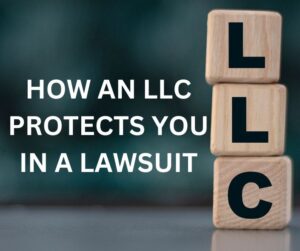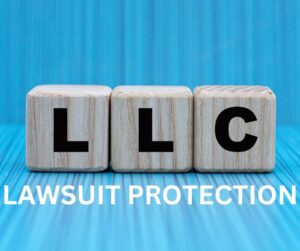For many entrepreneurs and business owners, selecting the right business structure is a critical decision that can impact their personal liability, tax obligations, and operational flexibility. If your business or LLC is being sued, then contact our business litigation lawyer today.
Among the various business structures available, the Limited Liability Company (LLC) is particularly favored for its ability to shield personal assets from business liabilities and legal disputes. This protection is a fundamental characteristic of the LLC, making it an attractive option for individuals seeking to minimize their personal risk. This blog post explores how an LLC provides this protection, under what conditions it operates, and how business owners can ensure they maximize the benefits of their LLC status.
The Basics of LLC Protection
What does an LLC protect you from?
An LLC can protect you from personal liability.

What does limited liability mean in the context of an LLC?
Limited liability means that the personal assets of the business owners, such as personal bank accounts, homes, and other personal possessions, are protected from creditors and legal claims against the business. Essentially, only the assets within the LLC can be targeted by lawsuits or creditors.
To ensure you fully benefit from an LLC’s protection, it’s crucial to understand exactly what limited liability entails and how it applies to your specific business activities. Consulting with a Texas LLC dispute lawyer can provide clarity on how forming an LLC could benefit your particular business scenario, helping you to navigate the complex landscape of business law effectively.
How an LLC Separates Personal Asset from Business Assets
Legal Separation of Assets in an LLC
One of the primary mechanisms through which an LLC protects its members is by clearly delineating personal assets from business assets. This separation is recognized by the court system and creditors, making it significantly harder for lawsuits against the business to impact the personal financial standing of its members.
How does an LLC separate personal assets from business debts?
An LLC functions under a legal structure that treats the business as a separate entity from its owners. This means that the business is responsible for its own debts and obligations. Properly maintaining this separation involves clear documentation and management practices that distinguish personal finances from those of the business.
To reinforce this separation, LLC members should always use separate bank accounts for business transactions and avoid using personal assets for business expenses. Additionally, maintaining accurate and comprehensive financial records that reflect this separation will further protect personal assets from potential legal actions.
LLC Protection Against Lawsuits
LLCs are designed to offer robust protection in legal disputes, ensuring that members’ personal assets are generally not at risk even if the business is sued. This setup provides significant peace of mind for business owners, particularly those in industries with higher risks of litigation.
What happens to my personal assets if my LLC is sued?
In the event of a lawsuit against your LLC, creditors and plaintiffs can only pursue the assets owned by the LLC. Personal assets, such as your home, personal bank accounts, and other non-business property, are typically not accessible in these lawsuits.
While the LLC structure provides substantial protections, ensuring these protections hold when they are most needed requires careful compliance with legal practices and business operations. Regular consultations with a business lawyer can help you navigate potential legal pitfalls and maintain the integrity of your LLC’s protective structure.
When LLC Protection May Not Apply
While the protection offered by an LLC is comprehensive, there are exceptions where personal assets might still be at risk. Understanding these exceptions is crucial for maintaining the effectiveness of an LLC’s protective shield.
When are my personal assets at risk in an LLC?
Personal assets can be exposed if a member personally guarantees a loan or debt, commits fraud, or if there is a failure to maintain the formalities required for keeping the LLC status active.
Avoid using personal guarantees unless absolutely necessary, and ensure that all business activities are conducted transparently and ethically. Regularly review your business practices and compliance status with a legal advisor to ensure that your LLC remains in good standing.
Enhancing Your LLC’s Lawsuit Protection
Beyond the basic protections afforded by an LLC, there are strategies that can further minimize your vulnerability to lawsuits.
How can I enhance the lawsuit protection provided by my LLC?

Regularly review your insurance coverage to ensure it meets your business needs, update contracts as necessary, and conduct periodic audits of your business practices to identify any potential liabilities.
Suing an LLC With No Assets
Can I sue an LLC with no assets?
Yes, you can sue an LLC even if it appears to have no assets, but there are several considerations to keep in mind:
- Assessment of Viability: While you can legally initiate a lawsuit against an LLC with no assets, the practicality of doing so depends on what you aim to achieve. If the LLC truly has no assets, recovering any financial damages or compensation through the lawsuit could be unlikely.
- Hidden or Future Assets: Sometimes, an LLC may currently have no assets but could acquire assets in the future, or there may be undisclosed assets. A lawsuit might enable you to claim against future assets or discover hidden ones through the legal process.
- Piercing the Corporate Veil: In some cases, if you can prove that the LLC has been operating fraudulently, improperly, or has not adhered to the legal formalities required of an LLC, you might be able to “pierce the corporate veil.” This legal action can hold the individual members of the LLC personally liable for the debts and liabilities of the LLC.
- Insurance Claims: It’s also possible that the LLC has insurance policies that could cover the claim you are making. Thus, suing the LLC could allow you to make a claim against the LLC’s insurance.
- Strategic Lawsuits: Sometimes, the purpose of the lawsuit isn’t directly related to immediate financial recovery but could be aimed at obtaining a legal judgment that could be used in various ways, such as pressuring the LLC into a settlement or changing business practices.
- Costs vs. Benefits: Consider the costs of legal action, including attorney fees and court costs, against the potential benefit. If the likelihood of recovering any compensation is low, the financial burden of litigation might outweigh the benefits.
Before Suing an LLC with No Assets You Should…
- Consult a Lawyer: Before initiating a lawsuit, consult with a lawyer who specializes in business or bankruptcy law to assess the viability of your case and explore all possible avenues for recovery.
- Investigation: Conduct a thorough investigation or have your lawyer do so to uncover any possible hidden assets or insurance policies.
- Consider Alternative Solutions: Explore other avenues for resolution outside of court, such as mediation or direct negotiation, which might lead to a more cost-effective solution.
Suing an LLC with no apparent assets presents unique challenges and requires careful consideration of the potential outcomes and costs involved.
Find LLC Business Litigation Lawyers Near Me
An LLC offers significant legal protections for business owners, effectively separating personal assets from business debts and providing a shield against many forms of litigation. However, maximizing the benefits of an LLC requires diligent management, proper legal advice, and a proactive approach to business practices and compliance.
If you’re operating a business and have not yet considered how an LLC could benefit you, now is the time to seek professional advice. Evaluate your current business structure and consider the potential advantages of transitioning to an LLC. A qualified business attorney can provide invaluable insights and guidance, helping you to secure your business and personal assets against unforeseen legal challenges.
